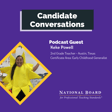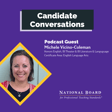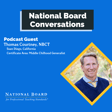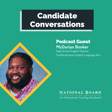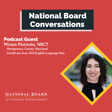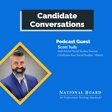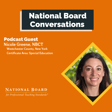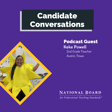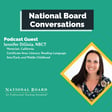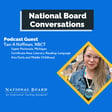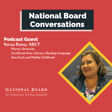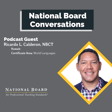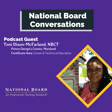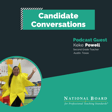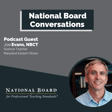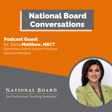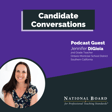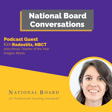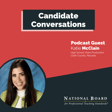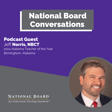Become a Creator today!Start creating today - Share your story with the world!
Start for free
00:00:00
00:00:01

Mirta Valdes-Bradner
What’s going on everyone, on this episode of National Board Conversations we head over to the Maryland Eastern Shore to chat with Mirta Bradner. She is a National Board Certified Teacher in Maryland and is a huge advocate for AP Courses in underserved communities having worked with Maryland Governor Larry Hogan to secure funding for AP in schools. We talk about the importance of AP courses in schools, and how taking AP Courses can be helpful to students of color. Read more about her AP advocacy journey
Be sure to follow us on all our social media platforms to keep up with all National Board related updates.
Twitter: @NBPTS
Instagram: @NBPTS
Facebook: The National Board for Professional Teaching Standards
Transcript
Introduction: Meet Mita Davaldez-Bradner
00:00:00
Speaker
What's going on everyone on this episode of National Board Conversations. We head over to the Maryland Eastern Shore to chat with Mita Davaldez-Bradner. She's a National Board Certified Teacher in Maryland and is a huge advocate for AP courses in underserved communities. Having worked with Maryland Governor Larry Hogan to secure funding for AP in schools.
Why Advanced Placement Courses Matter
00:00:16
Speaker
We talked about the importance of AP courses in schools and how taking AP courses can be helpful to students of color. I hope you enjoy this one. Here's my conversation with Mita Davaldez-Bradner. Hey Mita, how are you doing today?
00:00:29
Speaker
I'm doing great. Thanks for having me. Oh yeah. No problem. No problem. So can you, we're going to kick us off real quick with a little introduction yourself. Can you tell us what your role is and what you, where are you at and what your current job is?
Mita's Personal Journey: From Puerto Rico to Maryland
00:00:41
Speaker
Sorry about that. So yes, I was born and raised in San Juan, Puerto Rico. My parents were Cuban refugees that came to the island with my brother and one of the Johnson freedom flights. And they went to Puerto Rico because that's where we had family. Puerto Rico and Cuba are, you know, two sister islands. So I was blessed to be born and raised there.
00:00:58
Speaker
speaking only Spanish. I went to a neighborhood school. I still have the same friends I had that I had in the second grade. My parents really never spoke English. And then I always wanted to go to college in the States. So I ended up going to American University in Washington, DC, opened a whole new world to me. I have a degree in Spanish literature. And then I moved to the Eastern Shore of Maryland, which is,
00:01:24
Speaker
you know, about, uh, I would say about 45 minutes from Minneapolis, an hour and a half from DC, an hour and a half. So it's really around, it's just big bear around water. So, you know, people that love water always want to be around water. And, um, five years into living here, someone said, Hey, you speak Spanish.
Discovering a Passion for Teaching Spanish
00:01:42
Speaker
Can you teach Spanish? And I was like, I mean, I, I know Spanish. I don't know if I can teach it for like, it's a different, different thing to do. And you know what? I started teaching, um, middle school.
00:01:53
Speaker
And then I was asked to teach high school. I got my certifications and I absolutely love, I love teaching. I've taught everything from elementary to high school, but definitely high school is my calling and public school is my calling. So I teach in a small county about 20 minutes where I live and Maryland's Eastern shore is a rural county. Right now we have a lot of immigrants from different places. It's a free and reduced lunch school. Majority of people, 35%.
00:02:22
Speaker
And I brought the AP program of Spanish language in 2006. I believe that education is universal. Everybody deserves to have great courses and great teachers. And it should be available to all in our schools. Yeah, I wholeheartedly agree. You know, it sounds like you became a teacher almost by mistake. By mistake. Can you share a little bit more about what happened? It was like an accidental thing. And that was almost 25 years ago.
00:02:51
Speaker
Oh, man. So why did you end up pursuing board certification.
The Impact of National Board Certification and Mentorship
00:02:56
Speaker
I and We had a superintendent at the time, Dr. Edward Shirley He had come to the shore from Montgomery County and he was big into the national board certification and I decided to go through that I realized that become a national board certified was not about
00:03:12
Speaker
best of the best but it's about recognizing the things that I could improve. I remember the video being recorded and I was thinking it's going to show my mistakes but it was I felt it was like a bird's-eye into my classroom and how I could improve and I think it also made me look at my lessons and look at what I was doing you know some of our books and languages are so out of date and you still have to teach that syntax but let's bring
00:03:37
Speaker
lessons that are really valuable to students who are in our classrooms. How can they connect? What can we do to make it valuable to them? And that's what I start thinking of that. And I think the national board process was so important. And that year we had about nine teachers in our small county that went to the process and passed on the first time and that was wonderful. That's awesome. So how did going through the process help you in your role as a teacher?
00:04:04
Speaker
I think it helped me grow to my classroom. It helped me believe more in myself. Also, it made me believe that others should be following that path as well, and also have a voice for those who don't have a voice. I also felt that the National Board process was important because it gives you a different thing to doing anything else. I thought it was more challenging for me to see what I was doing than doing a master's degree, which I did pursue later on.
00:04:34
Speaker
but I think the national board, the solid, the solidarity that I got from the teachers, from the people at national board, and there was, I believe I was the first national board certified teacher in Spanish and world languages in Spanish and the Eastern Shore of Maryland. I actually worked with a math teacher to help me. She was my mentor. And I think that mentorship, it is a process that I recommend to everyone. I think, did you become a stronger teacher, a more independent thinker as a teacher? And I think you also,
00:05:04
Speaker
bring that to your students every day. And I think that's important in today's world as well. Yeah, I agree. I mean, I think board certification has been helpful to a lot of students and I'm hoping we can get that across the country, but that's a goal for another day.
00:05:21
Speaker
You wrote an article for us about your advocacy for AP classes, something I was afraid to take during school. But I think they're super important and you was able to get Governor Larry Hogan to use ESSER funds to fund tests and stuff for Maryland students.
Advocacy for AP Courses and Securing Funding
00:05:40
Speaker
What made you be, what drives you to be such an advocate for AP courses for students?
00:05:45
Speaker
So I remember that we did not have an AP. As a high school student, there was no AP courses available to me in my school. When I came to North Carolina High School, I started with that AP Spanish course in 2006. Again, very important to students are given the best courses and they are able to take it. And I think those courses should be available to all of our students. I think the low economic areas are students that
00:06:14
Speaker
are from low income family symptoms are not given those choices. And I think they should be available for them. The college board, I've been, it was called the all income pay many years ago. So I've always been in touch, always advocating. And when a college board reach out to us, there was three of us on the stage who actually joined this very small group. And the three of us have been advocating. We met with Senator Van Hollen first, then with Delegate Solomon, and then with Governor Hogan. Governor Hogan,
00:06:43
Speaker
allocated funds, not just for that, but also the standardized testings for results for AP tests are important. There's a standardized score in Maryland colleges because a three could mean something in a college and a three could mean something in another college. That's something that we're working very hard that becomes an equalizer because for our families of students, a score that is a passing score can mean a lot of money for them to be able to attend college.
00:07:12
Speaker
And we know that for students who want to attend college, it can change generations in the future. So this is how we can change things around. And I think it just impacts the learning. I think in AP classes, there's a different world that you're thinking. I don't think myself as a teacher, I think myself as the tool in the class. And I think for them, it opens their mind, opens their world. And we also have to get the stigma out
00:07:40
Speaker
that a score of below a three is a failure. It's a failure to the teacher, it's a failure to the student. We wanna celebrate that they have taken that course, that they have gone through it. And I think that's something that the AP Advocacy has done for me and it's gonna be doing for many in many schools in Maryland. Yeah, you know, I think so too. Like I grew up in Massachusetts and like I told you, I was afraid to take AP courses. Like I had friends who took them. It was just, I just felt way intimidating. And so I think,
00:08:10
Speaker
With my mindset now, I probably would have taken them, uh, when I was in high school and I think it's super important for them for availability, because I know some people in the city, I grew up in, they didn't even have the availability of AP courses. And so having them available is super important and I'm glad you're doing this work. Also, you know, AP tests are expensive and you have the able to be paid for. It's important. I think that.
00:08:36
Speaker
Not just for low income families, for our working families, if you have taken several courses and you know, you have several kids in school, it's really a burden. And to be able to have this funding is going to help many more students and many more families to be able to do that without being a burden to their families during this economic times as well. Yeah, that's very helpful. Do you think teachers have responsibility to push students towards AP courses? I think teachers have a responsibility to want students to
00:09:05
Speaker
do their best and follow through. I think that when you have access to equal courses, you're offering them opportunities. And I think opportunities need to be universal to us. For example, in my case, I teach, you know, we have Spanish teachers, Spanish one to Spanish AP.
00:09:22
Speaker
I teach all three foreign AP it's nice for them to follow through. Also, regardless of the outcome of the scores, they will take that knowledge to their next step. And I think, especially, even if the students do not follow a college and they have a career.
00:09:36
Speaker
We know that with languages, globally be able to speak another language or understand it's important. Another thing that I was very serious in my school is for us, too, and I brought it to my school, was a seal of biliteracy for our students who are of native speakers to be able to pass that seal of biliteracy are able then to have an opportunity to pass that test, have that in their transcript, have that in their diploma, and being able to get a better opportunity for a job in Maryland as well.
00:10:03
Speaker
That's amazing. So how have you seen AP culture change in your time as an advocate?
Future of AP Culture: Accessibility and Support
00:10:10
Speaker
Um, you know, I think everything takes time, but I think, I think we're going to go in a great process now. I'm going to see things forward when we see this money that has been allocated to it. Um, for example, for me is really important that if you're in my class, you must take the test. And I think that also, I think as a teacher, you have that relationship with the students and you have that culture from the beginning. I think the fear has to be gone.
00:10:33
Speaker
that they're not going to be able to do it. The students are able to do this. Even during the pandemic, I had students who had to take the test online on their phones and were able to do it. And just given the support that is needed to do this. But I think that things are going to start changing. This is not just here. We have 23 state leaders in Maryland, but we have 14 states working on this for College Board. So when you look at this, we have over 1,600 advocates in the nation advocating in all of their states.
00:11:01
Speaker
to make this AP advocacy better for all of our students across the nation. Man, this is amazing. So what is your dream for AP culture and AP courses in the future? I think my dream for AP culture would be that we know that it would be accessible to all, that students know that they can do it,
00:11:23
Speaker
that are do we get the support that we need and the preparation that we need and that we get the training that we need when it's there. There's not a lot of money for professional developments. And I think that that would be for our teachers to be recognized and be able to attend, you know, AP conferences and be able to do things like that. Also, for our students to know that
00:11:44
Speaker
this is an important step in their collegiate career and to do it and not to be afraid and also to see that our minorities are taking more of these courses. Usually that's our students who are not taking the courses as in comparison. I do want to say that I have some statistics and in 2020, 28% of the test takers in Maryland were from low-income families. So the money that has been allocated would be very important
00:12:11
Speaker
to pay for those tests in 2021 and 2022. So that's, yep. It was really good, man. That's a big key. Like you said, don't be afraid to take them. Don't be like I was growing up. You know, you gotta be able to challenge yourself. You go into a course with a mindset that you can't do something. You have to go into the mindset that yes, it is possible. And to have that faith on your teachers that are going to prepare you for that test, but also that the teachers get the funding that they need in order
00:12:39
Speaker
to get the training, the professional development to be able to help the students in their courses. So what do you think we need to help develop more of a culture, more of a advanced placement, AP type style culture? I think that we need to bring that into all of our schools and not just into some of our schools. I think that teachers like me, I try to spread the word on my school. I send my blog to all the AP teachers in my school. I feel like I'm always advocating.
00:13:14
Speaker
collegiate readiness is important for all or for your career, for what you want to do, and not to be afraid to take a chance. So what's worse than to happen? If you get a one or a two, that's still great. You still try it. It was a college level course. It was something above the way you have done in high school. And I think that students sometimes are afraid to do that because someone has put the fear on them and have other students. It would be great to have other students say, hey, take this class with me or you should take this class that I took last year.
00:13:34
Speaker
for things for our students, I think that the readiness
00:13:42
Speaker
And that would be something that would be so positive in the AP culture as well. Yeah, you know, some of the board certification is probably easier to do it with a friend. Exactly. You know, I did it with a math teacher. So I think that's great. I then got recertified with an engineering teacher.
00:13:58
Speaker
And so I think that it's a possibility. And I just signed up to be a mentor for the board certification. So if anyone out there needed my help, I would be happy to help with whatever I could. Amazing that we need it. All right. So one thing I like to do on this podcast is get to know you a little bit outside the classroom. So I got a list of three questions for you to get you out of the ordinary. So first question I got for you.
00:14:26
Speaker
What restaurant or home recipe recommendations do you have right now?
Culinary Delights: Mita's Husband's Cooking
00:14:30
Speaker
Restaurant? Yeah, restaurant or home recipe, whichever is easier for you.
00:14:34
Speaker
So I have to be honest, my husband is the cook and he cooks all of my mom's recipe. And he just made the other day on the Instapot, Ropa Vieja, which is old clothes. And he did it in the Instapot. He also makes my mom's arroz con pollo. And he makes it all in the Instapot and he didn't even want to have an Instapot, but he does. But I think he's also, he's also a teacher. He's a teacher. He's pursuing his PhD right now, which is a lot of work. There's always somebody doing schoolwork in our house.
00:15:00
Speaker
Let me tell you, he's making those Latino and Cuban and Puerto Rican recipes in the Instant Pot, and they're amazing. But that shredded clothes out of paella was amazing. Oh, I'm about to have to try that. If you had a lifetime supply of the last thing you bought, what would it be? Mascara. Nice. And last one, what's the worst physical pain you've ever felt?
00:15:23
Speaker
I would have to say when I had a root canal, I did not like going to the dentist and I did not want to have to go and I wouldn't do anything to the dentist again. I feel that I had an extended dentist appointment not too long ago and the feeling in my mouth was just the worst.
00:15:44
Speaker
I would just, I would do anything. I would watch windows. I would run. I would do anything, but not going to the dentist.
Closing Remarks and Social Media Connect
00:15:51
Speaker
And if you want to ask my favorite thing, my favorite person is my dog, Romeo, who's 15. He's a pug 15. Oh yeah. We got to, we got to give a shout out to Romeo 15 living long. He's barking downstairs because he's distraught that I came upstairs. He just misses you so much. Yeah.
00:16:07
Speaker
Oh, well thank you for taking the time. This was a lot of fun. We love to see MBCTs taking all leadership roles and advocating for their schools. It was great to talk to her and I just wanted to thank her again for taking the time to chat with me. And thank you for listening to the National Board Conversation. Be sure to follow us on social media for all National Board-related updates. And we'll see you next time.
